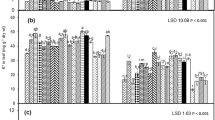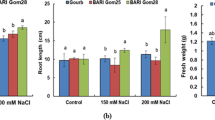Summary
The relative salt tolerance of two wheat species (Triticum aestivum L., cv. Probred and Triticum turgidum L., Durum Group, cv. Aldura) at different stages of growth was determined in a greenhouse experiment. Plants were grown in sand cultures that were irrigated four times daily with modified Hoagland's solution. Salinization with NaCl and CaCl2 (2:1 molar ratio) provided seven treatment solutions with osmotic potentials (Ψ s ) ranging from −0.05 to −1.25 MPa (electrical conductivities of 1.4 to 28 dS/m). Salt stress was imposed for 45 days beginning at either 10, 56, or 101 days after planting. The three 45-day stages are referred to here as the vegetative, reproductive, and maturation stages although the first stage included spikelet differentiation. In a separate experiment, seedling growth was measured after 21 days of salt stress (Ψ s = −0.05 to −0.85 MPa) initiated at 0, 7, 11, and 16 days after planting. Salt stress (Ψ s = −0.65 MPa) delayed germination by 4 days for both wheats but full emergence occurred. Relative growth response curves of the seedlings were alike regardless of whether salt stress was imposed at planting or at the 1st, 2nd, or 3rd-leaf stage of growth. Salt stress also retarded leaf development and tillering but hastened plant maturity. Grain yields from plants stressed during either the vegetative, reproductive, or maturation stages indicated that both species became less sensitive to salinity the later plants were stressed. Grain yield was reduced 50% at Ψ s = −0.76, −1.53, and −1.58 MPa for Probred and −0.65, −1.08, and −1.34 MPa for Aldura when salinized during stages 1, 2, and 3, respectively. Salinity reduced grain yield by reducing seed number more than seed weight indicating that salt stress during stage 1 affected spikelet differentiation. Straw yield was significantly reduced by salt stress only during stage 1. Leaf mineral analyses revealed that Aldura readily accumulated Na whereas Probred did not. Both species accumulated Cl but the concentrations were much higher in Aldura. K uptake was severely inhibited by salt stress imposed during the first stage but not when imposed the second stage.
Similar content being viewed by others
References
Briggle LW (1967) Morphology of the wheat plant. In: Quisenberry KS, Reitz LP (eds) Wheat and Wheat Improvement. Agronomy Monograph No. 13, American Society of Agronomy Inc., Madison, p. 89
Cotlove E (1963) Determination of true chloride content of biological fluids and tissues. II. Analysis by simple nonisotopic methods. Anal Chem 35:101
Francois LE, Maas EV, Donovan TJ, Youngs VL (1986) Effect of salinity on grain yield and quality, vegetative growth, and germination of semi-dwarf and durum wheat. Agron J 78:1053
Hann JR (1973) Visual quantification of wheat development. Agron J 65:116
Maas EV (1986) Salt tolerance of plants. Appl Agric Res 1:12
Maas EV, Poss JA, Hoffman GJ (1986) Salinity sensitivity of sorghum at three growth stages. Irrig Sci 7:1
Rhoades JD (1984) New strategy for using saline waters for irrigation. Proc ASCE Irrig Drain Spec Conf, Water-Today and Tomorrow, July 24–26, 1984, Flagstaff, Arizona, p 231
SAS Institute (1982) SAS user's guide: Statistics 1982 edn SAS Institute, Cary, North Carolina
van Genuchten MTh, Hoffman GJ (1984) Analysis of crop salt tolerance data. In: Shainberg I, Shalhevet J (eds) Soil salinity under irrigation. Springer, Berlin Heidelberg New York (Ecological Studies, vol 51, p 258)
Zadoks JC, Chang TT, Konzak CF (1974) A decimal code for the growth stages of cereals. Weed Res 14:415
Author information
Authors and Affiliations
Rights and permissions
About this article
Cite this article
Maas, E.V., Poss, J.A. Salt sensitivity of wheat at various growth stages. Irrig Sci 10, 29–40 (1989). https://doi.org/10.1007/BF00266155
Received:
Issue Date:
DOI: https://doi.org/10.1007/BF00266155




